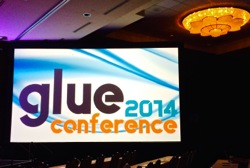 I attended the Glue Conference May 21-22 in Broomfield, CO, and a pre-event on May 20 called API Strategy & Practice. It was my sixth Glue in a row, since the event began in 2009. It's been a very popular developer event, and has grown each year — now attracting approximately 650 attendees. There were 70 speakers, selected from some 500 who applied. I've written extensively about each of the six Glue Conferences I've attended. This year, I reported for ProgrammableWeb for the first time. (More about that site below.)
I attended the Glue Conference May 21-22 in Broomfield, CO, and a pre-event on May 20 called API Strategy & Practice. It was my sixth Glue in a row, since the event began in 2009. It's been a very popular developer event, and has grown each year — now attracting approximately 650 attendees. There were 70 speakers, selected from some 500 who applied. I've written extensively about each of the six Glue Conferences I've attended. This year, I reported for ProgrammableWeb for the first time. (More about that site below.)
Here are my seven posts from #Gluecon 2014, in chronological order of the particular sessions that I wrote about:
• Developers at Roundtable Ask, ‘Are APIs Copyrightable?’ (863 words)
• ‘API First’ Isn’t Just for Startups Anymore (529 words)
• How to Secure Your REST API the Right Way (411 words)
• 10 Reasons Why Developers Hate Your API (918 words)
• Reverb, Apigee Announce Swagger 2.0 Workgroup (720 words)
• As APIs Proliferate, Can Search Scale to Keep Up? (388 words)
• API Design Should Be About ‘Interactive’ and ‘Tinkering’ (600 words)
I also shot a bunch of photos at the event, as I always do. Here's my Flickr set of Gluecon 2014.
About ProgrammableWeb: As the world's leading source of news and information about Internet-based application programming interfaces (APIs), ProgrammableWeb is known as the Web's defacto journal of the  API economy. Since it was founded in 2005, ProgrammableWeb (now based in San Francisco) has been chronicling the daily evolution of the global API economy while amassing the Web's most relied-on directory when it comes to discovering and searching for APIs to use in Web and mobile applications. In 2014, Gartner identified ProgrammableWeb as one of several “Cool Vendors” in Information Innovation. It is also the most widely-cited source of data related to APIs in the mainstream media, conferences, whitepapers, and other forms of research. ProgrammableWeb is where you can keep-up with what's new and interesting in a world where the Web is a programmable platform. When it says "the Web is a platform," it is referring to how Web-based and mobile apps are enabled by Internet-based APIs. For example, the way in which the developers of many location-aware apps are able to incorporate Google Maps into their wares with just a few lines of code (using the Google Maps API). Read more about ProgrammableWeb here.
API economy. Since it was founded in 2005, ProgrammableWeb (now based in San Francisco) has been chronicling the daily evolution of the global API economy while amassing the Web's most relied-on directory when it comes to discovering and searching for APIs to use in Web and mobile applications. In 2014, Gartner identified ProgrammableWeb as one of several “Cool Vendors” in Information Innovation. It is also the most widely-cited source of data related to APIs in the mainstream media, conferences, whitepapers, and other forms of research. ProgrammableWeb is where you can keep-up with what's new and interesting in a world where the Web is a programmable platform. When it says "the Web is a platform," it is referring to how Web-based and mobile apps are enabled by Internet-based APIs. For example, the way in which the developers of many location-aware apps are able to incorporate Google Maps into their wares with just a few lines of code (using the Google Maps API). Read more about ProgrammableWeb here.

Leave a Reply